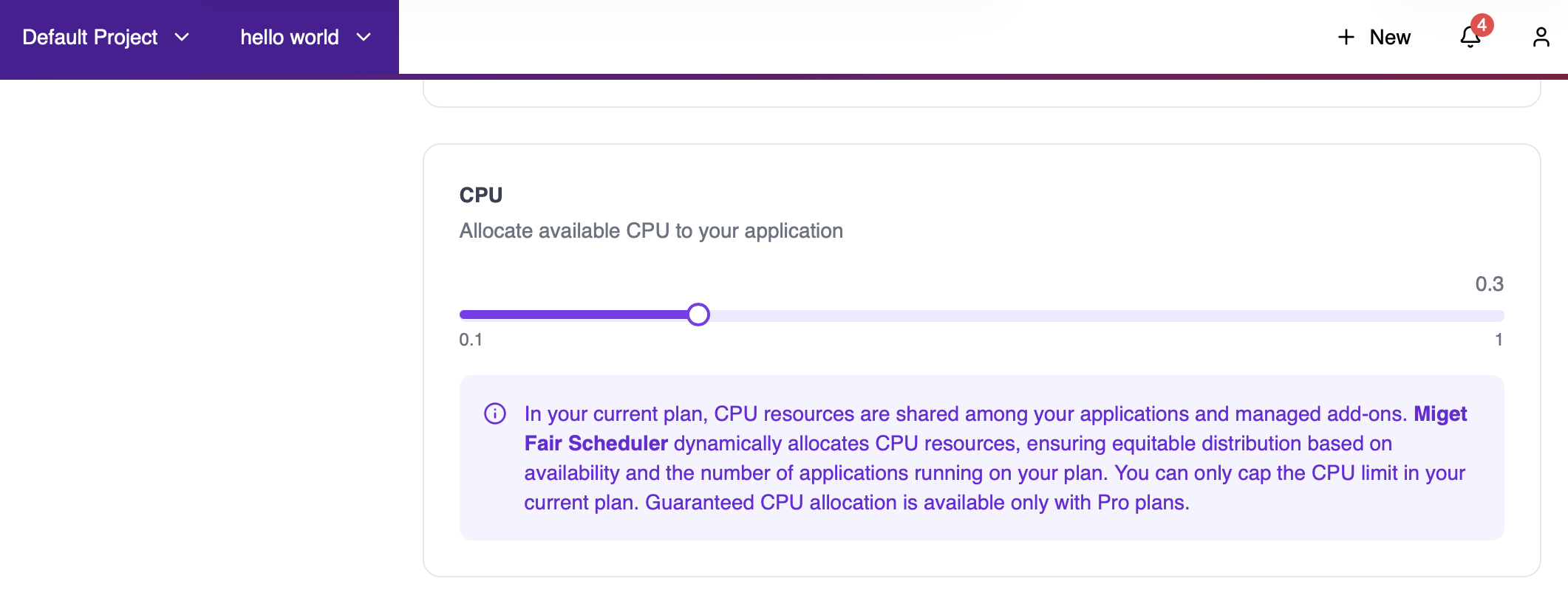How Miget Fair Scheduler Works: Dynamic CPU Sharing for Maximum Efficiency
How Miget Fair Scheduler Works
Running multiple applications efficiently on a single resource plan isn't just about containerization - it's about intelligent resource management. Miget's Fair Scheduler is the engine that makes "One Resource. Unlimited Apps." possible.
Here's how it works.
Secure: Workload Isolation on Dedicated Kubernetes Nodes
Each of your applications runs on a different physical Kubernetes node.
This isolation ensures that no single application can monopolize resources, providing stability and consistent performance across all your deployments.
Why This Matters
- Security: Applications are physically separated, reducing attack surface
- Performance: No noisy neighbor problems - your app's performance isn't affected by others
- Reliability: If one node experiences issues, your other apps continue running unaffected
# Example: Your apps distributed across nodes
stress2-ral21-web-7fe7ddfdc-pn4r7 1/1 Running 0 40m 10.42.3.142 kube-node34
stress1-n1lps-web-67e4ddcfc6-gzztq 1/1 Running 0 40m 10.42.3.142 kube-node17
stress2-ral21-web-7fe7ddfdc-pn4r7 1/1 Running 0 40m 10.42.4.135 kube-node22
Each deployment runs on its own dedicated node, ensuring complete isolation.
Dynamic: Fair CPU Sharing with Dynamic Allocation
The Miget Fair Scheduler dynamically allocates CPU resources between your applications based on their real-time needs.
Let's look at a real example using a 1 vCPU plan (1 CPU, 2 GiB RAM) with two applications:
Application A: Web Server
- Resource Demand: 0.6 CPU and 1 GiB RAM
- Behavior: Handles HTTP requests with occasional CPU spikes during peak traffic
Application B: Background Worker
- Resource Demand: 0.4 CPU and 600 MiB RAM
- Behavior: Processes background jobs at steady load, occasionally needs more CPU for intensive tasks
How Dynamic Allocation Works
Idle State:
- Both applications share the CPU equally, each receiving 0.5 CPU
- If Application A is idle, Application B can utilize up to 1.0 CPU, and vice versa
High Demand Period:
- During peak traffic, Application A demands more CPU (e.g., 0.8 CPU)
- The Fair Scheduler adjusts by allocating 0.8 CPU to Application A and 0.2 CPU to Application B
- This ensures the web server remains responsive while the background worker continues operating
- When demand subsides, allocation reverts to a balanced state
Burst Handling:
- If both applications spike simultaneously, the scheduler ensures fair distribution based on configured limits and current demands
- Each receives a portion of the 1.0 CPU, adjusted dynamically to maintain overall system performance
The Result: No wasted resources. Apps that need CPU get it. Apps that don't need it don't hog it. Everyone gets a fair share based on actual demand.
Non-Disruptive Limit Adjustments
Miget CPU Scheduler allows you to adjust the CPU limits of your applications without restarting them.
This means you can dynamically change resource allocations on the fly, ensuring seamless operation and uninterrupted service, providing you with the flexibility to adapt to varying workloads effortlessly.
Dedicated CPU in Pro Plans
For applications that require guaranteed, non-shared CPU resources, Miget Pro plans offer dedicated CPU allocation.
What's the difference?
- Hobby Plans: CPU is shared fairly among your apps using the Fair Scheduler. Apps can burst and share resources dynamically.
- Pro Plans: Each app gets dedicated CPU cores that are never shared with other applications. Your app always has its full CPU allocation available.
When to use Dedicated CPU:
- Production workloads requiring consistent performance
- CPU-intensive applications (video processing, ML inference, data analysis)
- Applications with strict SLA requirements
- Workloads that can't tolerate any CPU contention
With dedicated CPU, you get predictable, isolated performance - perfect for mission-critical applications.
CPU Cap: Fine-Grained Resource Control
Sometimes you want to limit how much CPU a specific application can use, even if more resources are available. That's where CPU caps come in.
How CPU Caps Work:
You can set a maximum CPU limit for any application, telling the Fair Scheduler not to allocate more than that limit - even during idle periods when extra CPU is available.

Why Use CPU Caps?
- Resource Prioritization: Ensure critical apps get resources first
- Cost Management: Prevent runaway processes from consuming your entire plan
- Multi-Environment: Run dev/staging/prod on one plan with controlled limits
- Predictable Behavior: Know exactly how much CPU each app can consume
CPU caps give you granular control while still benefiting from the Fair Scheduler's dynamic allocation for other apps.
Real Cost Savings Example
Let's compare real pricing for running 5 small apps (web app, API, worker, admin dashboard, staging):
Heroku
- 5 × Basic dynos ($7 each) = $35/month
- Plus $5/month for Postgres Mini = $40/month total
Render
- 5 × Starter instances ($7 each) = $35/month
- Plus $7/month for Postgres Starter = $42/month total
DigitalOcean App Platform
- 5 × Basic apps ($5 each) = $25/month
- Plus $15/month for Managed Postgres = $40/month total
Miget with Fair Scheduler
- 1 vCPU + 2 GiB RAM plan = $10/month
- Includes all 5 apps + PostgreSQL database
- Savings: $30-32/month (75-80% less)
Running 10 apps? You'd pay $70-84/month on other platforms vs. $10-20/month on Miget. The Fair Scheduler makes it possible.
Why This Matters for Your Business
Traditional PaaS platforms charge per app. With Miget's Fair Scheduler:
- Deploy unlimited apps under one resource plan
- Pay for resources, not apps
- Get guaranteed CPU/RAM with fair sharing
- Scale without surprise bills
The Fair Scheduler is what makes "One Resource. Unlimited Apps." not just a tagline, but a reality.